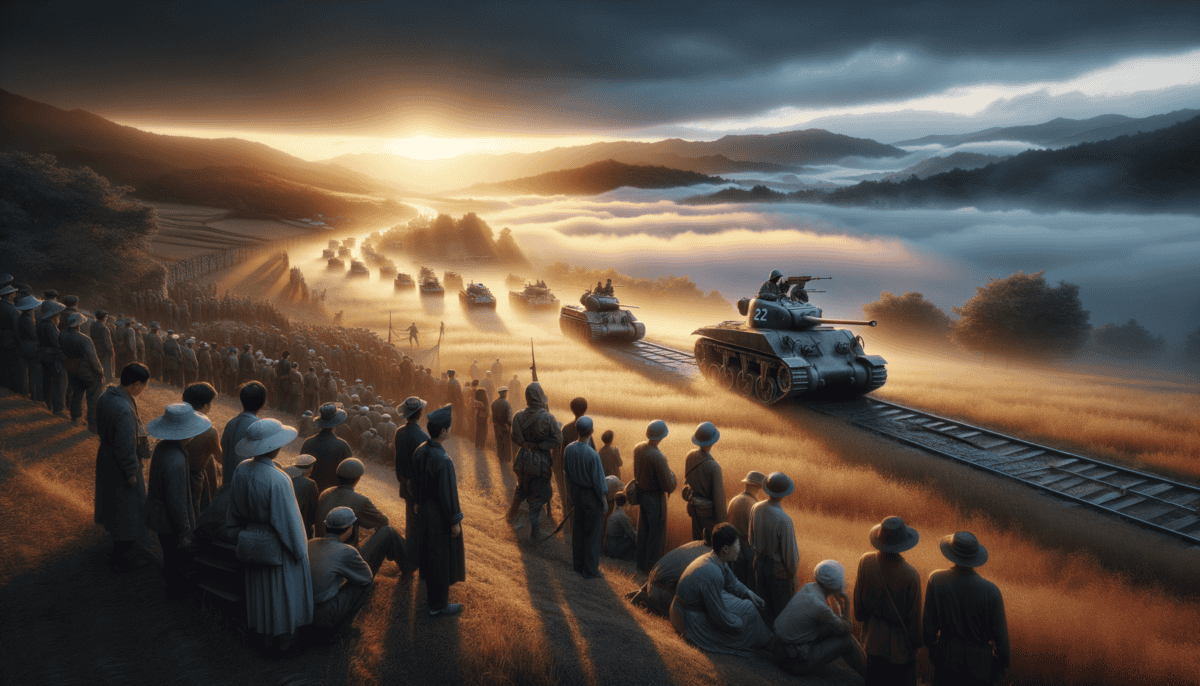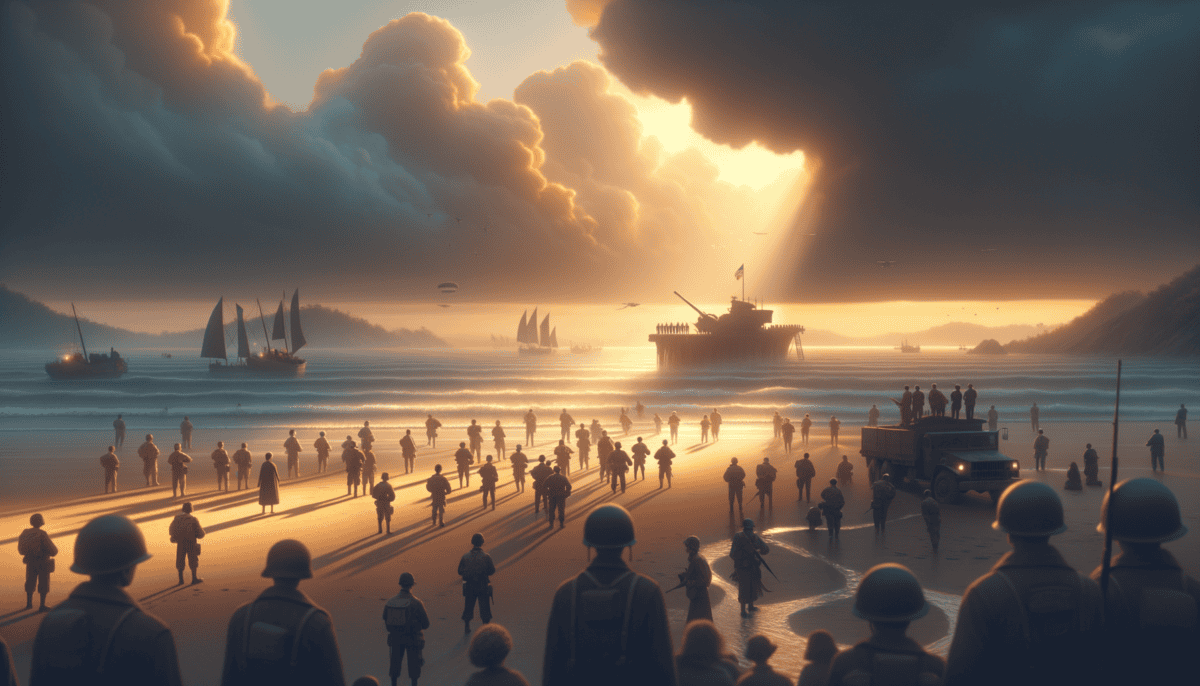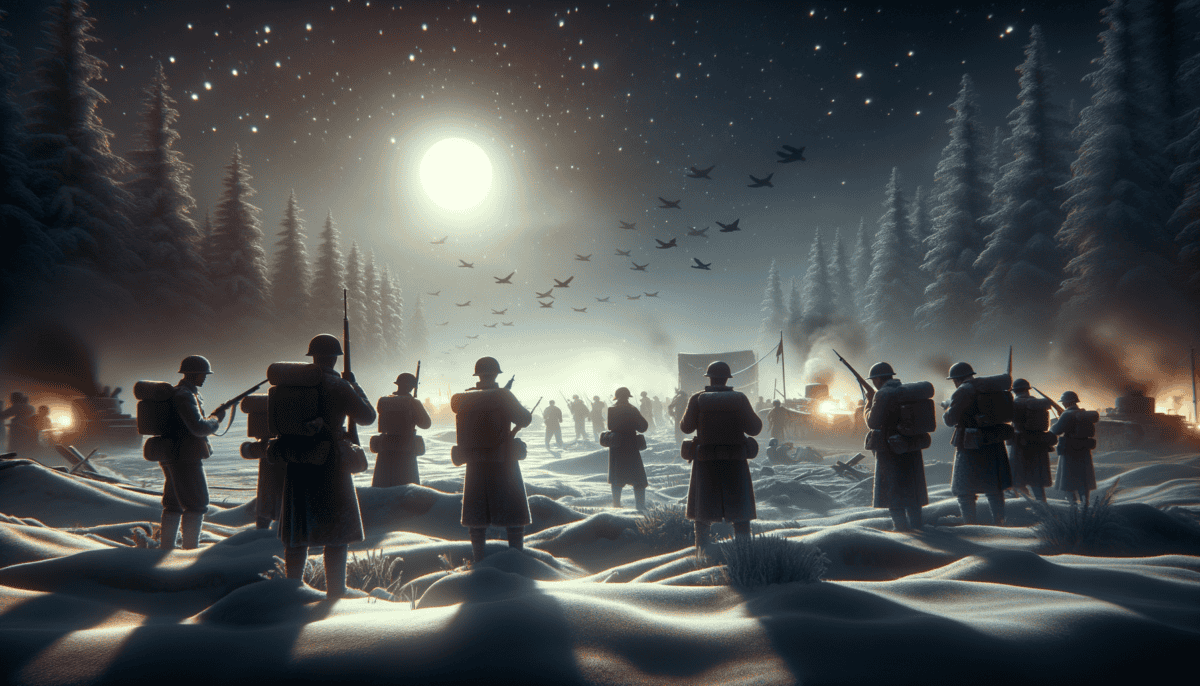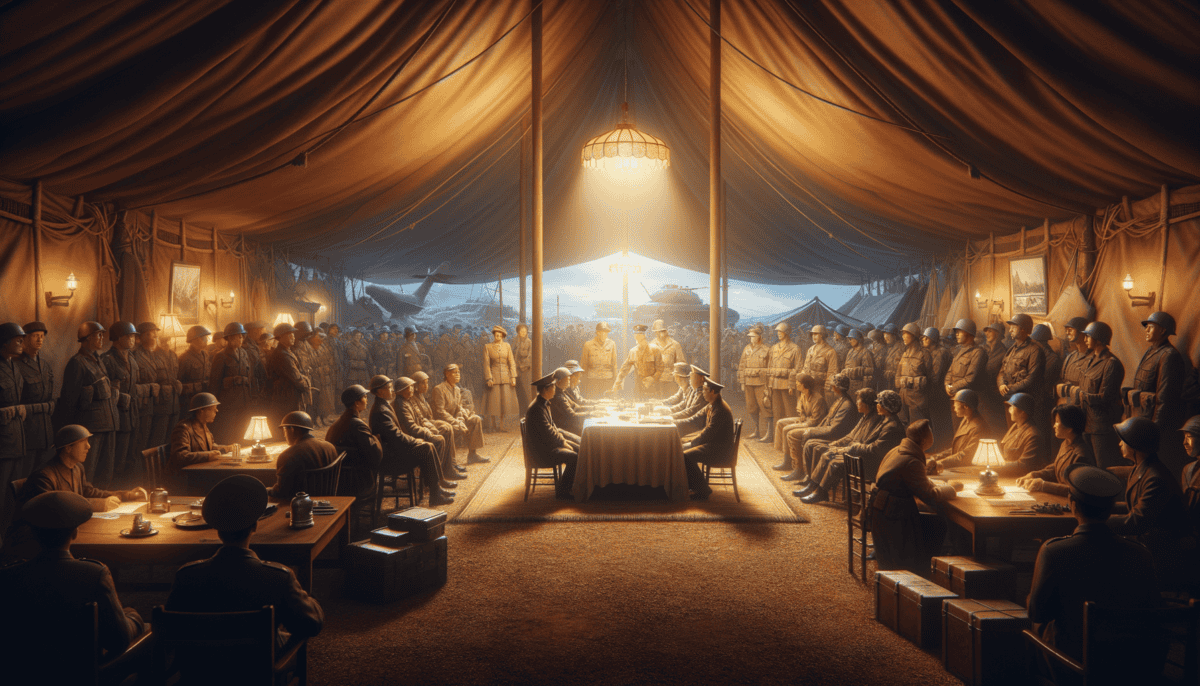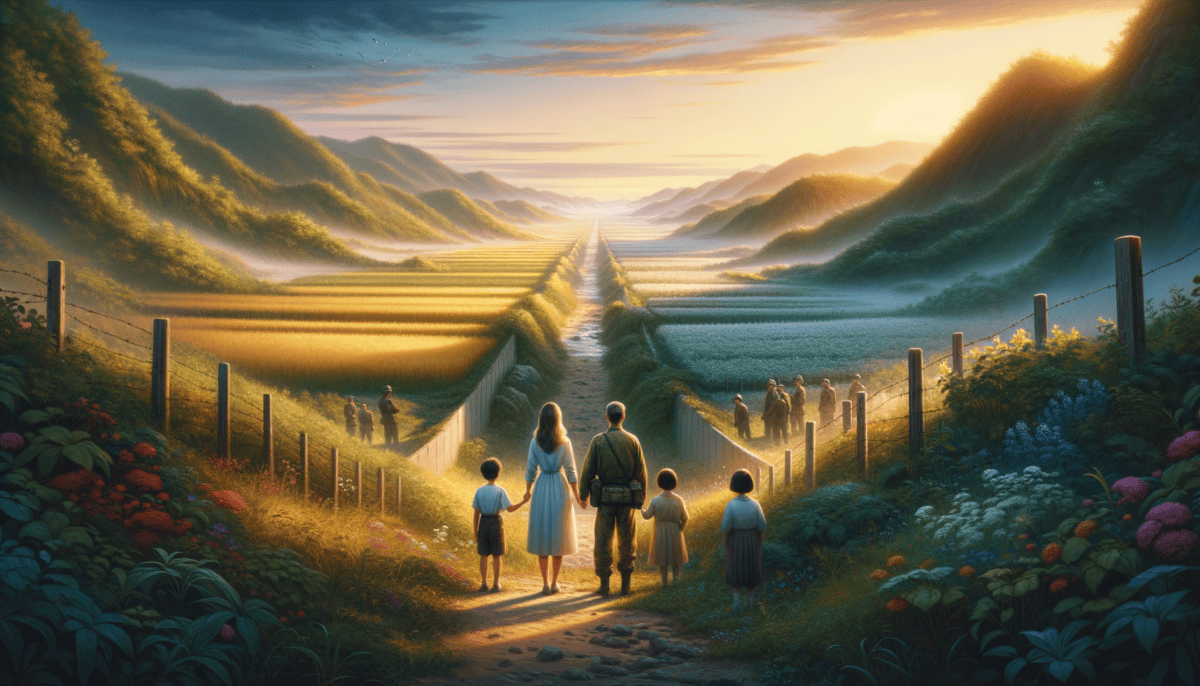Shadows of Occupation
Little Min-ji sat by her grandmother's side, watching the sun set over their small village near Seoul. The year was 1945, and big changes were coming to Korea.
"Grandmother, tell me again about the time before," Min-ji whispered, tugging at her grandmother's sleeve.
Her grandmother smiled softly. "Ah, little one. Korea was once one whole country – like a single sheet of paper. But now…" She picked up a piece of paper and carefully tore it in half. "Now we are split into two parts."
The split happened at something called the 38th parallel – a line drawn across Korea by other countries after World War II. To the north were the communists, supported by the Soviet Union. To the south were those who wanted democracy, backed by America.
Min-ji could feel the tension in the air. Even at her young age, she noticed how adults would whisper in corners and quickly change the subject when children came near. Something wasn't right.
"But why did they split us, Grandmother?" Min-ji asked.
Her grandmother sighed deeply. "It's complicated, little one. For many years, Japan ruled over Korea. When Japan lost the big war, other countries came to help us. But they couldn't agree on how to help."
In the streets of their village, Min-ji saw more and more soldiers. Some wore different uniforms than others. People spoke in worried tones about the differences between North and South Korea.
The changes happening in Korea were like a storm brewing:
- People moved between North and South
- Different leaders took control of each side
- Both sides said they were the real Korea
- Families got split apart
- Soldiers from other countries came
Min-ji's friend Jun-ho hadn't been at school lately. His family had moved north, and she wondered if she'd ever see him again.
"Will there be fighting, Grandmother?" Min-ji asked, her voice trembling.
Her grandmother pulled her close. "I pray not, little one. But we must be brave, no matter what comes."
At night, Min-ji could hear the adults talking about troops building up near the border. The North had strong weapons. The South was getting help from America. Both sides were angry with each other.
The air felt heavy with worry. Like the calm before a storm.
One evening, Min-ji's father came home looking serious. "They say the North is getting ready for something big," he told her mother in a quiet voice. "We must be prepared."
Min-ji hugged her favorite doll tighter. She didn't understand everything that was happening, but she knew their peaceful life was about to change. The split between North and South Korea was more than just a line on a map – it was a wound that would affect millions of lives.
As spring turned to summer in 1950, the tension grew stronger. More soldiers appeared in the streets. More families moved away. And Min-ji's grandmother kept holding her close, whispering stories of a united Korea that seemed more distant with each passing day.
In the distance, thunder rumbled. Or maybe it was something else. Min-ji looked up at the darkening sky and wondered what tomorrow would bring. The shadow of war loomed over Korea, and nothing would ever be the same.
Dawn of Conflict
The morning of June 25, 1950, started like any other summer day. Min-ji was helping her mother hang laundry when they heard it – a sound like angry thunder, but the sky was clear.
“Inside, quickly!” her father shouted, running into the yard. “The North Korean army has crossed the border!”
The peaceful morning erupted into chaos. The radio crackled with urgent news:
Min-ji’s family huddled in their small house, listening to the distant explosions. Her mother packed a small bag with their most important things. “Just in case,” she said, trying to smile.
“Where will we go?” Min-ji asked, clutching her doll.
“South,” her father answered. “The American soldiers will help us.”
The First Days
The North Korean army moved fast. They had big tanks and lots of soldiers. The South Korean army tried to stop them, but they weren’t ready for such a big attack.
“It happened so fast,” Min-ji’s grandmother said. “Like a storm that comes without warning.”
More news came on the radio. The United Nations was sending help! Countries from all over the world were going to help South Korea:
- America sent ships and planes
- Britain promised soldiers
- Other countries offered food and medicine
- The UN said North Korea must stop fighting
- South Korea got ready to defend itself
Min-ji watched as American soldiers arrived in their village. They looked tired but kind. One soldier named Tom gave her a piece of chocolate.
“Don’t worry, little one,” he said with a smile. “We’re here to help.”
But the fighting got closer. Min-ji could see smoke rising from nearby villages. More people arrived in their town, carrying what they could save from their homes.
The Great Escape
One night, the sounds of battle got very close. Min-ji’s father made a hard choice.
“We must leave for Busan,” he said. “It’s safer in the south.”
They joined a long line of people walking south. Min-ji held her grandmother’s hand tight. Some people carried babies. Others helped old folks who couldn’t walk well.
“Look at all these people,” Min-ji whispered. “Are they all leaving their homes too?”
“Yes,” her grandmother answered. “But remember – home is where your family is.”
The summer sun was hot, and walking was hard. But American planes flew overhead, protecting them. ✈️
At night, they slept in fields or schools. Min-ji heard grown-ups talking about a place called Seoul falling to the North Korean army. Her heart hurt thinking about her home, her school, her friends.
“When will we go back?” she asked her father.
He looked at the stars and said softly, “When it’s safe, little one. When it’s safe.”
As they walked, more soldiers passed them heading north – Americans, South Koreans, and others from the UN. They were going to fight back. The war was just beginning, and no one knew how long it would last.
The warm summer wind carried the sounds of battle behind them, but Min-ji kept walking forward, holding tight to her family and her hopes for peace.
Tides of Change
The hot September sun beat down on General MacArthur’s ship as he watched the waters near Incheon. The Americans had a big plan to surprise the North Korean army.
“This will change everything,” he told his officers, pointing to the map. The tide at Incheon went up and down more than most places – perfect for a secret attack!
Meanwhile, Min-ji and her family were still in Busan with other people who had run away from their homes. One morning, she heard exciting news on the radio.
“Listen!” her father called out. “The UN forces are pushing the North Koreans back!”
The Big Landing
On September 15, 1950, huge ships appeared near Incheon harbor. Marines climbed down rope ladders onto smaller boats. The water was rough, but they were brave.
“Remember boys,” Captain Jones told his men, “we’re here to help free Korea.”
The North Korean soldiers didn’t expect anyone to attack at Incheon. The water was tricky, and the walls were high. But that’s exactly why MacArthur chose it!
“Sometimes the hardest path is the best path,” MacArthur said. “The enemy won’t expect us here.”
The Big Push
The UN soldiers fought hard. They took back Incheon, then moved toward Seoul. People cheered as they marched through freed towns.
Young Private Kim was with the South Korean army. He saw families coming back to their homes:
“Welcome home!” he called to a little boy carrying a small bag.
“Is it really safe now?” the boy asked.
“We’re making it safe,” Private Kim smiled. “That’s a promise.”
Hope Returns
Min-ji’s family heard good news every day. The UN forces were winning! They took back Seoul and kept going north.
Important things that changed:
- Seoul was free again
- Many families could go home
- UN forces crossed the 38th parallel
- North Korean army was running away
- People felt hopeful about winning the war
One day, Min-ji’s father said the words she’d been waiting for: “We can go home now.”
Their house was still standing, but some things were broken. Min-ji found her favorite book under her bed, dusty but okay.
“Look what I saved!” she showed her mother proudly.
“Just like we saved our hope,” her mother smiled, hugging her tight.
New Worries
But not everything was happy. Some people whispered about China maybe joining the fight. General MacArthur wanted to keep pushing north, but others worried this might make China angry.
Min-ji’s grandmother looked worried when she heard the adults talking. “War is like a dragon,” she said. “You never know which way it will turn next.”
The air was getting colder as autumn came. UN forces were close to China’s border. No one knew what would happen next, but for now, Min-ji was just happy to be home.
At night, she looked at the stars through her window, the same stars that had guided her family south, and then back home again. The war wasn’t over, but hope had returned to Korea.
Winter’s Fury
Snow fell softly over the frozen hills of North Korea. ❄️ Private Tommy Wilson pulled his coat tighter as he walked through the Chosin Reservoir camp. The temperature had dropped to twenty below zero.
“Keep moving, boys!” Sergeant Miller called out. “Movement keeps you warm!”
It was November 1950, and something big was about to happen. Nobody knew it yet, but thousands of Chinese soldiers were hiding in the snowy mountains.
The Night Everything Changed
One dark night, bugles echoed through the valleys. Chinese soldiers appeared like ghosts in the snow. They had come to help North Korea!
“They’re everywhere!” Tommy shouted to his friend Jimmy. The UN soldiers scrambled to defend themselves as waves of Chinese troops charged down the hills.
Back in Seoul, Min-ji heard the scary news on her father’s radio. “The Chinese army has joined the fight,” the announcer said gravely.
The Frozen Battle
At Chosin Reservoir, American Marines fought bravely in the bitter cold. Their guns froze. Their food froze. Even their medicine froze! But they didn’t give up.
“We’re surrounded,” said Colonel Smith to his officers. “That means we can attack in any direction!”
The Marines had a saying during those cold days:
| “Retreat, hell! | We’re just attacking in a different direction!” |
The Long March South
The UN forces had to move back south. They carried their wounded through mountain passes and frozen valleys. The temperature dropped to forty below zero! ⛄
Things the soldiers battled:
- Freezing temperatures
- Deep snow
- Chinese attacks
- Frozen equipment
- Dangerous mountain roads
Tommy helped push trucks up icy hills. His hands were so cold they felt like wood. But he remembered what his mother always said: “As long as we stick together, we can get through anything.”
A City in Fear
In Seoul, Min-ji’s family packed their bags again. The Chinese army was getting closer every day.
“Will we have to leave again?” Min-ji asked her mother.
“Yes, sweetheart,” her mother said softly. “But this time we know the way.”
The streets filled with people heading south. Cars, trucks, and ox carts crowded the roads. It was like summer all over again, but this time with bitter cold and snow.
Heroes in the Cold
Despite the harsh conditions, amazing acts of bravery happened every day. Doctors worked in freezing tents to save wounded soldiers. Pilots flew through snowstorms to drop supplies. Korean civilians shared their food with hungry soldiers.
“Look after each other,” Sergeant Miller told his men. “That’s how we’ll survive.”
Tommy never forgot those words. Years later, he would tell his grandchildren about the frozen battle at Chosin Reservoir, where soldiers from different countries fought together in the coldest winter anyone could remember.
The war had changed again. As snow covered the battlefields, everyone wondered what spring would bring. But for now, they focused on surviving one day at a time in this frozen land.
The Long Road Home
Spring 1951 brought warm sunshine, but the fighting continued. The war had turned into something no one expected – a long, hard struggle with no clear end in sight.
“Sometimes the hardest battles are the ones that just keep going,” Sergeant Miller told his tired soldiers.
A Different Kind of War
Tommy sat in his foxhole, writing a letter home. The fighting had changed. Instead of big battles, both sides now fought over hills and valleys, winning them one day and losing them the next.
“Dear Mom,” Tommy wrote, “We move back and forth so much, I’m not sure if we’re going north or south anymore. But don’t worry – I’m okay.” ✉️
Peace Talks Begin
In a tent at Kaesong, important people from both sides met to talk about peace. They sat at long tables, speaking through translators.
“Will they stop fighting soon?” Min-ji asked her father.
“I hope so, little one,” he answered, looking at the newspaper headlines. “But sometimes making peace is harder than making war.” ️
| What They Wanted: | To stop the fighting and make Korea peaceful again |
| What Was Hard: | Neither side wanted to give up what they had fought for |
Life Goes On
While the grown-ups talked about peace, life had to continue. Min-ji started going to school again in a tent. Her teacher taught them math and reading, even when they could hear bombs in the distance.
The kids helped too:
- Growing vegetables in small gardens
- Helping younger children learn
- Carrying water for their families
- Writing letters to soldiers
- Collecting useful things from broken buildings
Keeping Hope Alive
Tommy made friends with a Korean boy named Jun-ho who lived near their camp. They couldn’t speak each other’s language very well, but they shared food and played games together.
“Look,” Jun-ho said one day, pointing to a flower growing through a crack in a broken wall. “새 생명 (New life).”
Tommy didn’t understand the words, but he understood what Jun-ho meant. Even in the middle of war, new things could grow.
Waiting for Peace
Days turned into weeks, and weeks turned into months. The peace talks went on and on. Sometimes they would stop, then start again.
Min-ji’s mother started a small school in their neighborhood. “We must keep learning,” she said. “War or no war, children need to grow.”
At night, Tommy would look at the stars and think about home. “The same stars shine over America,” he thought. “Over North and South Korea too. Maybe that means we’re not so different after all.”
Small Victories
While the big peace talks continued, people found ways to make things better in small ways. Soldiers helped rebuild schools. Families shared what little food they had. Children made friends across language barriers.
“Sometimes,” Sergeant Miller said, watching some kids play soccer with his soldiers, “the best victories aren’t won with guns.” ⚽
The war wasn’t over, but people were learning to live with hope for tomorrow. They didn’t know it yet, but bigger changes were coming soon.
A Different Peace
July 27, 1953 dawned bright and clear. After three long years of fighting, something big was about to happen.
“Today, we sign for peace,” the radio announcer said. His voice trembled with emotion.
The Day Everything Changed
Tommy stood with his unit, watching as important people walked into a building at Panmunjom. They were going to sign papers to stop the fighting.
“Is it really over?” whispered a young soldier.
Sergeant Miller nodded slowly. “The fighting stops today. But this isn’t like other wars – there won’t be a winner and a loser. Just… a pause.” ✋
The New Border
Workers began putting up signs and fences. They made a special place called the DMZ – a strip of land where nobody could go. It was like a big line drawn across Korea.
Min-ji watched from her house as people marked the new border. “Will we ever see our cousins in the North again?” she asked her mother.
Her mother hugged her tight. “Sometimes hearts stay connected even when lands are divided.” ❤️
Two Different Koreas
| South Korea: | Started building new cities and schools |
| North Korea: | Became very closed off from the world |
Saying Goodbye
Tommy packed his bags, ready to go home. Jun-ho came to say goodbye.
“친구 (Friend),” Jun-ho said, giving Tommy a small wooden carving.
Tommy smiled, understanding perfectly. He handed Jun-ho his baseball cap. “Friends,” he repeated.
Looking Forward
South Korea started to change quickly. Min-ji watched as:
- New buildings rose from broken streets
- Children returned to real schools
- Families started businesses
- People helped each other rebuild
- Hope grew stronger each day
Dreams of Tomorrow
Years later, Tommy showed his grandchildren Jun-ho’s wooden carving. “The war taught us something important,” he said. “Peace isn’t just about stopping fights. It’s about building bridges between people.”
In Seoul, Min-ji grew up to be a teacher. She told her students about the war, but also about hope. “Maybe someday,” she would say, “all Korean families will be together again.”
The DMZ still stands today. But something else stands too – the spirit of people who dream of peace. Both Koreas remember the war differently, but they share one hope: that someday, the line between them might fade away.
And so, the story of Korea continues. Not as one country, but as two – each looking across the DMZ, remembering they were once whole, and wondering if someday, somehow, they might be again. ️


